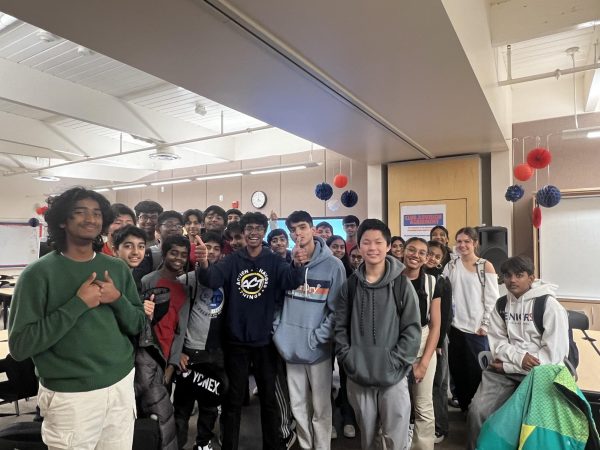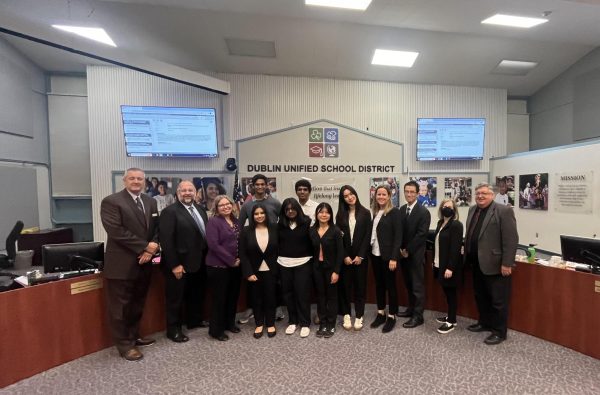Driving Demands of College Admissions and Decisions: What You Can Do
The feeling that accompanies the journey.
As each year passes by, the pressure for Dublin High students only increases. We all want to attend that one dream school, whether it’s an UC or an Ivy League university. Some students don’t feel this stress, but it’s not something that can be ignored. We’ve all heard stories of how competitive tBay Area schools are- but when did this start? When did we start to push ourselves to be that “perfect” student — someone who plays more than one sport, has a perfect GPA, leads a club, won a national level competition, completed an internship… you get the gist.
The stress builds up over a long period of time. We start off freshman year with high hopes for ourselves and end up hoping that our extracurriculars, test scores, and essays would be enough to make the cut in junior year. It’s almost a given- that fervent necessity to keep receiving A’s and join a multitude of clubs. It’s come to the point where many of us believe that these grades and extracurriculars are what define us. In the course of pursuing that outstanding GPA, we lose time out of our high school life. The uninterrupted study sessions create confusion when we are finally given the choice to pick a major- we end up choosing a job just for its pay rather than an intrinsic passion for it. The passion that can’t even be discovered since we sacrificed so much time off of our high school lives in order to perfect our GPA. After choosing all those AP classes, we can’t visualize a clear future. We simply do it for the grade bump or the accompanying benefits.
So, what makes America that “model country”? Why do people from foreign lands want to put their children into our unchanged education system? It’s simple- almost everyone here is subject to thought that their grades are everything. From the outside, this may be viewed as a positive outlook- something along the lines of, “Do your best and you’ll get into that one school everyone is fighting for”- but sometimes, that ‘best’ effort isn’t enough to be accepted. You cram all of this knowledge into your brain, but only for the sake of fulfilling your desire for well-rounded grades. By the time junior year rolls in, you don’t have time to indulge yourself in activities that allow you to relax. That one concert you’ve always wanted to attend clashes with the time you have allocated to study. Once more, you won’t be able to relax on a trip during break since you have other academic commitments.
So why are we under such pressure? How can we overcome this? First, we need to understand what we can do to reduce stress.
What can you expect?
Understanding what a college looks for is a hassle and can honestly cause a lot of stress, but it is key to reducing the aforementioned stress. Truth be told, what qualifies you to be accepted into these top schools simply can’t be spelled out. Colleges look at multiple factors when they begin their admission process. Although, there are a few key components that every student should try their best on in order to create a more confident application. Here they are, listed in order of relative importance:
- Grade Point Average (GPA)
- Teacher Recommendations + Essays
- Test Scores (ACTs, SATs, Subject SATs, AP Exam Scores)
- AP Courses taken
- Extracurriculars + Internships
The same old, same old. You’ve probably seen the same list time after time. Your GPA is what matters the most, but colleges have recently added the option of sending in teacher recommendations. After asking a few of my college friends at an internship, they mentioned that the recommendation letter may outweigh the importance of your test scores since the teachers would know your work ethic better than a stressful 3 hour test.
If your GPA is not so hot, you might want to focus on showcasing your extracurriculars. For example, if you have an interest in gaming, you might want to consider understanding the code that enables the game to work. Perhaps, this may spark your interest to create a game of your own- of course, with the help of the people in your community. What I’m really trying to say is that you shouldn’t feel constrained to your grades only. Taking up an internship could be a meaningful experience. You’re not limited to STEM based internships- there are so many more non-academic opportunities for you to better your leadership and thinking skills. In fact, many companies (mainly engineering and literature based) look for experience rather than what schools you’ve attended. So take a break from worrying about that math test. Try to research other options.
Finances
One other side-effect of attending a high-end university is the burning hole that it would leave in your wallet- something a lot of us don’t consider when thinking about colleges. Think about the fees that you will have to pay in order to attend this college. Would you blow all your savings into attending an expensive university and miss the chance to attend other jobs/internships? Or would you rather spend your money on a relatively affordable college and gain valuable work experience through joining a job earlier in your life? The choice is really yours, but planning out the expenses may serve as a helpful guide to choosing the college you attend. This article could help you narrow down your choices.
What Else?
It’s imperative to note that what you do in high school will not carry on throughout your life. Receiving a 4.0 unweighted GPA doesn’t exactly secure a better future for yourself. Rather than blaming colleges and universities for their high expectations, it is in our hands to eliminate the need to be the perfect student. By doing so, not only do we create an easier lifestyle for everyone, but we also get the chance to explore all the different things that the world has to offer us.
Your donation will support the student journalists of Dublin High School. Your contribution will allow us to purchase equipment and cover our annual website hosting costs.


































